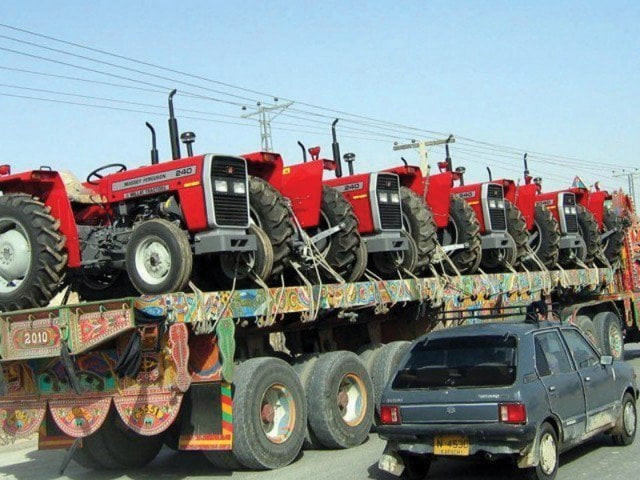Hitting where it hurts: ‘Revenue from tractor industry to see big fall’
PAAPAM chief says farmers’ buying power has been hit, tax contribution to be below Rs2b.

PAAPAM chief says farmers’ buying power has been hit, tax contribution to be below Rs2b. PHOTO: FILE
Pakistan Association of Automotive Parts and Accessories Manufacturers (Paapam) is looking to grab the government’s attention, stating that tax revenue from the tractor industry is likely to take a hit and land below the Rs2-billion mark for the ongoing fiscal year.
Paapam Chairman Mumshad Ali said the ongoing crisis that has engulfed the farming community will take its toll on the tractors segment as well, resulting in an almost 67% drop in tax contribution from the industry.
“Tax contribution of the tractor industry last year was Rs6 billion which is expected to drop below Rs2 billion due to demand drying up,” Ali told a group of journalists on Monday.
The drop in sales, and therefore production, has been caused due to the decreasing buying power of Pakistani farmers who have been hit by falling commodity prices, he said.
Ali said no funds were allocated for tractor purchase in the Kisan Package announced by the federal government, adding that subsidy schemes announced by Punjab and Sindh have also been either sidelined or cancelled.

“This industry has a tier one supplier base of 500 units with an estimated skilled and semi-skilled base of 50,000 directly employed people.
“Experts estimate that the chain of people affected by the crisis of the tractor industry would be half a million people.”
While blaming inconsistent, erratic and short-term strategies of the government, Ali said lack of cohesion between the federal and provincial governments has affected farmers.
“The GST regime has changed many times in the last 5-6 years, ZTBL’s loaning system is also erratic and mark-up rates are as high as 12% -14%, whereas the current kibor is at 6.5%.
“The tractor subsidy schemes from the provinces are also short term and result in an artificial demand followed by an artificial slump.”
Recommending the government to implement long-term policies, Ali said there was a need for low mark-up rates and a scheme such as the Apna Rozgar Taxi Scheme for tractors as well.
Saeed Iqbal, a Paapam member and leading tractor parts maker, said an erratic demand pattern is detrimental for any industry. Irfan Qureshi a heavyweight of the foundry sector, said the work was labour-intensive and needed government’s attention.
Mohammad Saleem and Razzak Gohar, running two leading forging industries, said there was a need to improve the horse power available per-hectare, to bring it at par with India’s.
Published in The Express Tribune, January 5th, 2016.
Like Business on Facebook, follow @TribuneBiz on Twitter to stay informed and join in the conversation.



















COMMENTS
Comments are moderated and generally will be posted if they are on-topic and not abusive.
For more information, please see our Comments FAQ